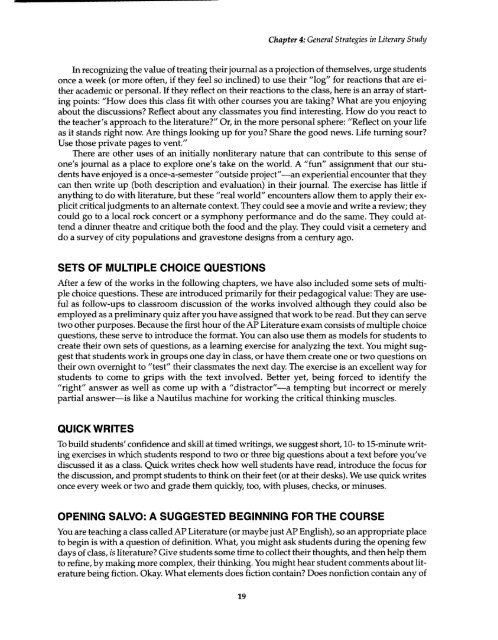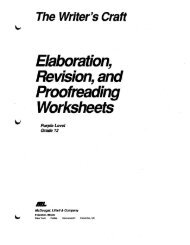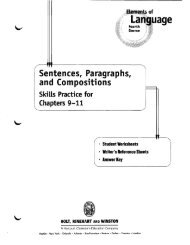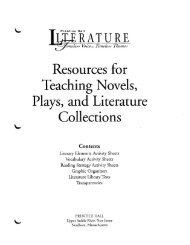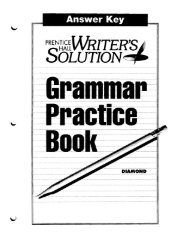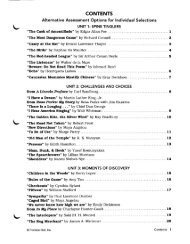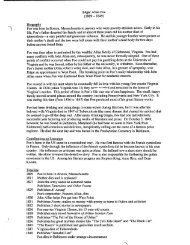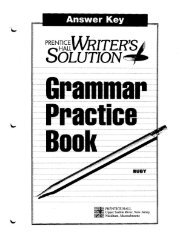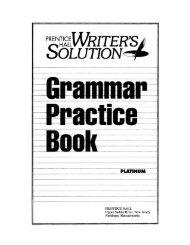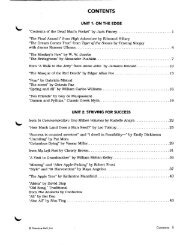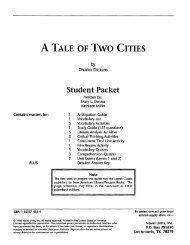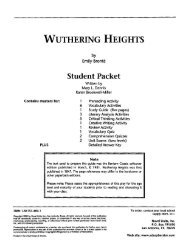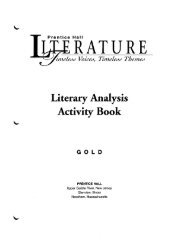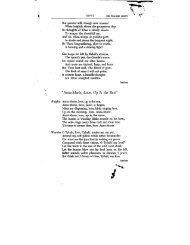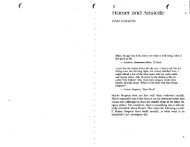English Literature & Composition - PopulationMe.com
English Literature & Composition - PopulationMe.com
English Literature & Composition - PopulationMe.com
Create successful ePaper yourself
Turn your PDF publications into a flip-book with our unique Google optimized e-Paper software.
Chapter 4: General Strategies in Literary Study<br />
Inrecognizing the value of treating their journal as a projection of themselves, urge students<br />
once a week (or more often, if they feel so inclined) to use their "log" for reactions that are either<br />
academic or personal. If they reflect on their reactions to the class, here is an array of starting<br />
points: "How does this class fit with other courses you are taking? What are you enjoying<br />
about the discussions? Reflect about any classmates you find interesting. How do you react to<br />
the teacher's approach to the literature?" Or, in the more personal sphere: "Reflect on your life<br />
as it stands right now. Are things looking up for you? Share the good news. Life turning sour?<br />
Use those private pages to vent./I<br />
There are other uses of an initially nonliterary nature that can contribute to this sense of<br />
one's journal as a place to explore one's take on the world. A "fun" assignment that our students<br />
have enjoyed is a once-a-semester "outside project" -anexperiential encounter that they<br />
can then write up (both description and evaluation) in their journal. The exercise has little if<br />
anything to do with literature, but these "real world" encounters allow them to apply their explicit<br />
critical judgments to an alternate context. They could see a movie and write a review; they<br />
could go to a local rock concert or a symphony performance and do the same. They could attend<br />
a dinner theatre and critique both the food and the play. They could visit a cemetery and<br />
do a survey of city populations and gravestone designs from a century ago.<br />
SETS OF MULTIPLE CHOICE QUESTIONS<br />
After a few of the works in the following chapters, we have also included some sets of multiple<br />
choice questions. These are introduced primarily for their pedagogical value: They are useful<br />
as follow-ups to classroom discussion of the works involved although they could also be<br />
employed as a preliminary quiz after you have assigned that work to be read. But they can serve<br />
two other purposes. Because the first hour of the AP <strong>Literature</strong> exam consists of multiple choice<br />
questions, these serve to introduce the format. You can also use them as models for students to<br />
create their own sets of questions, as a learning exercise for analyzing the text. You might suggest<br />
that students work in groups one day in class, or have them create one or two questions on<br />
their own overnight to 1/test" their classmates the next day. The exercise is an excellent way for<br />
students to <strong>com</strong>e to grips with the text involved. Better yet, being forced to identify the<br />
IIright" answer as well as <strong>com</strong>e up with a "distractor"-a tempting but incorrect or merely<br />
partial answer-is like a Nautilus machine for working the critical thinking muscles.<br />
QUICK WRITES<br />
To build students' confidence and skill at timed writings, we suggest short, 10- to 15-minute writing<br />
exercises in which students respond to two or three big questions about a text before you've<br />
discussed it as a class. Quick writes check how well students have read, introduce the focus for<br />
the discussion, and prompt students to think on their feet (or at their desks). We use quick writes<br />
once every week or two and grade them quickly, too, with pluses, checks, or minuses.<br />
OPENING SALVO: A SUGGESTED BEGINNING FOR THE COURSE<br />
You are teaching a class called AP <strong>Literature</strong> (or maybe just AP <strong>English</strong>), so an appropriate place<br />
to begin is with a question of definition. What, you might ask students during the opening few<br />
days of class, is literature? Give students some time to collect their thoughts, and then help them<br />
to refine, by making more <strong>com</strong>plex, their thinking. You might hear student <strong>com</strong>ments about literature<br />
being fiction. Okay. What elements does fiction contain? Does nonfiction contain any of<br />
19


